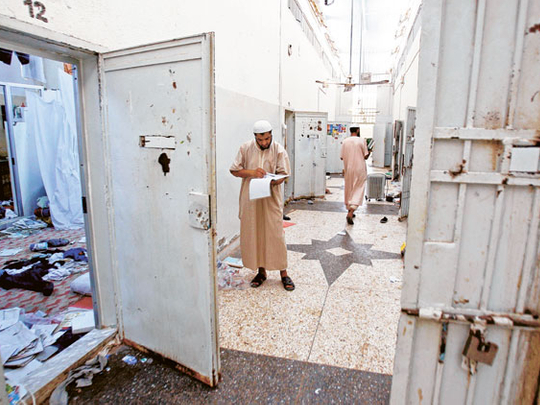
Tripoli The warden didn't leave room for ambiguity: Freedom was not an option, no matter what happened outside the walls, where the gunshots and explosions of a growing revolution regularly shattered the evening calm.
"If we win, you'll stay here for the rest of your lives," said the man, a functionary of Muammar Gaddafi's government whom prisoners knew only as Khalifa.
"If we lose, we will kill all of you." He seemed indifferent about which it would be. Khalid Abu Harber, a 27-year-old doctor caught smuggling medicine to Libyan revolutionaries, believed he was a doomed man. "I don't think any of us thought we would get out alive," he recalled.
Among the final sites in Tripoli to be liberated in August by the fighters who ended Gaddafi's 42-year reign was Abu Salim, an ominous citadel on the city's southwestern edge. Abu Salim was more than a prison, it was a brick-and-mortar embodiment of a dictator's capricious sway over his subjects. Motorists avoided driving near it, as if it could draw them into a malevolent gravitational field. But the notorious lockup also played a part in the revolt that finally toppled Gaddafi.
Memorial to victims
And as Libyans start rebuilding their society, it is taking on a new role — as a kind of memorial to Gaddafi's victims and a cautionary reminder of how a revolution can go astray. "Everyone cheered for Gaddafi when his revolution overthrew the king," said Abdul Rahman Shengheer, a lawyer and former Abu Salim inmate, referring to the 1969 military coup that ousted King Idris.
"We all thought Gaddafi would be the one who brought us freedom. But look what happened. We must be sure that history doesn't repeat itself." Long before the reeling Gaddafi regime launched a desperate roundup of suspected rebels and sympathisers, swelling Abu Salim's population, the penitentiary was infamous as a warehouse of humanity and a killing ground.
In June 1996, say human rights groups and survivors, about 1,200 inmates were killed after a prison uprising that infuriated Abdullah Senussi, Gaddafi's brother-in-law and, as Libya's longtime security chief, his chief enforcer. Senussi, like Gaddafi, is still on the run.
Anwar Haraga, 49, a computer engineer who now lives in Manchester, England, said he survived by chance. When the protest broke out, he had been in Abu Salim for seven years, probably because he wore a beard and clothing that made him look like an Islamist, he said.












